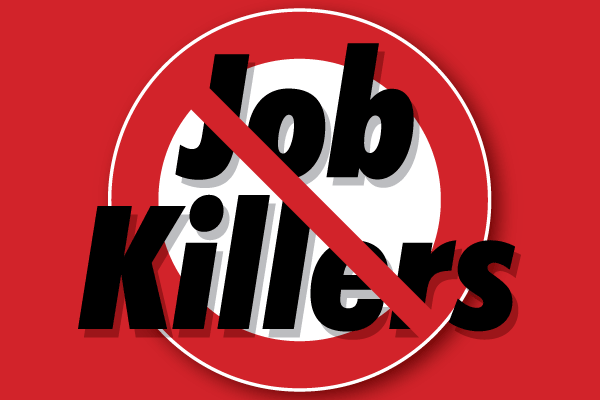A California Chamber of Commerce-opposed job killer bill that jeopardizes the production of California-based fuel stalled in its first policy committee this week when committee members failed to bring the bill to a vote.
AB 1645 (Muratsuchi; D-Torrance) bans the use of hydrogen fluoride and hydrofluoric acid at refineries that use more than 250 gallons and are located within 2 miles of a residence even though there are significant safety regulations in place at the local, state and federal levels.
CalChamber identified AB 1645 as a job killer because it does not consider the robust regulatory framework in place for chemical use nor does the proposal consider the negative economic impacts that will be felt should this legislation be enacted.
AB 1645 requires a refinery that at any time handles, maintains, or stores more than 250 gallons of hydrogen fluoride, including hydrofluoric acid and modified hydrofluoric acid, to, if possible, convert to a known, significantly less hazardous substitute by January 1, 2020.
If that conversion is not possible and the refinery is located within 2 miles of a residential dwelling, the bill requires the refinery to cease handling, maintaining, or storing hydrogen fluoride, including hydrofluoric acid and modified hydrofluoric acid, by January 1, 2020.
Numerous Uses
Hydrogen fluoride (HF) has a wide range of beneficial uses in California, and it is critical to the broader California economy. In addition to the production of gasoline, HF is used across the state in a variety of applications, including the production of fluorine-containing materials such as refrigerants, pharmaceutical intermediates and fluoropolymers.
Other uses include metals manufacturing, glass etching and polishing, stainless steel pickling, semiconductor preparation, agriculture and various applications in the chemical and specialty metal production industries.
Negative Impact on California Gasoline Supply
Hydrofluoric acid plays a critical role in making California-specification gasoline at two major refineries in Southern California. These refineries alone represent 13% of statewide refining capacity and, even more important, 23% of capacity in Southern California’s gasoline market.
Hydrofluoric acid is used in the alkylation process, which creates an integral component of gasoline that is required to meet California’s unique gasoline specifications. Without the ability to use hydrofluoric acid to make this component, neither of these refineries can produce California-grade gasoline.
The inability of these refineries to make California gasoline would have a significant impact on California consumers, jobs and the economy as a whole.
Robust Safety Measures in Place
Significant regulations are in place at the local, state and federal levels to ensure the safe handling, use and transportation of hydrogen fluoride and hydrofluoric acid.
From federal and state regulations on Process Safety Management to Department of Transportation regulations, there is a broad regulatory framework to ensure the safe use of hydrogen fluoride and reduce any impacts. Moreover, individual facilities that use and handle hydrogen fluoride and hydrofluoric acid have several mitigation measures in place, based upon their unique processes, to ensure further reduction of any risk associated with this product.
For example, the two refineries mentioned above have a number of layers of equipment within the refinery to ensure the safe use of acid.
Current Location
AB 1645 remains in the Assembly Environmental Safety and Toxic Materials Committee because committee members declined to vote for the bill.
To see the rest of the bills on the 2017 job killer list, visit www.CAJobKillers.com/Priorities.




